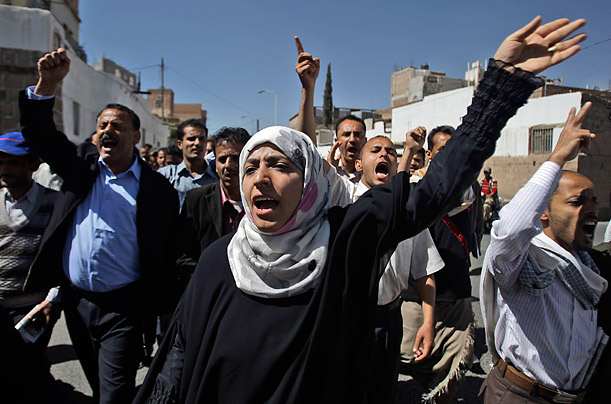Source:
On Jan. 23, 2011, Al Arabiya ran a story about the arrest of Yemeni activist, Tawakul Karman,
who was calling on Yemenis to show their support of the Tunisian revolution and demand a regime change in their country.
Nothing has changed in Yemen since Karman’s arrest [and subsequent release] except that on Friday, the young woman was propelled to worldwide fame after receiving the Nobel Peace Prize, along with two other women ─ Liberian President Ellen Johnson-Sirleaf and her compatriot Leymah Gbowee, who mobilized fellow women against their country’s civil war.
Karman, the 32-year-old mother of three, was not a leading candidate in the days leading up to Friday’s announcement for the highly anticipated Peace prize. Many were expecting it to go to participants or leaders of The Arab Spring, like Egyptian Wael Ghonim. Karman’s win has been as much a surprise as the Swedish poet Tomas Transtromer getting the Nobel for Literature – both came out of nowhere.
Yet, barely an hour after announcing her win, people on Twitter for calling for Karman to replace President Ali Abdullah Saleh as Yemen’s president.
This is because slowly the world is slowly learning about Karman’s tireless efforts in leading a regime change in her country.
Karman went into activism primarily after watching the injustices meted out to villagers in Ibb by a tribal leader years earlier. “I watched as families were thrown off their land by a corrupt tribal leader. They were a symbol to me of the injustice faced by so many in Yemen,” she said in an interview in March in The Guardian. “It dawned on me that nothing could change this regime, only protest.”
However, it is her arrest in January that galvanized the country’s youth into action that has yet to let up ─ first to protest her arrest, second to continue with their demands that Saleh step down.
Karman
was already known as an activist in Yemen since 2005 when she founded her organization, Women Journalists Without Chains, and a year later started a SMS news service which distributed news to subscribers. It was shut down in 2007 which is when she began organizing protests in Liberty Square in the capital Sana’a; sometimes a few would show up, other times thousands.
However, as she told Dexter Filkins in The New Yorker in April this year, events in Tunisia inspired her. “Tunisia was our solution — it hit me just like that,’’ she said. “The problem in our society is the regime, just as in Tunisia. The whole regime has to go.”
Karman was released 36 hours after being arrested, unharmed, but, according to The New Yorker, not before Saleh spoke to her brother, a poet, Tariq, warning him: “Control your sister. Anyone who disobeys me will be killed.”
In the same story, Karman spoke about how both her husband and father supported her work, even though they sometimes asked her to lay low on certain occasions, worried as they were for her safety. “I ignore them, of course,” she said.
Karman’s affiliation to the Islamist party Islah is bound to raise some concerns in the international community because one of its members, Abdel Majeed al-Zindani, is considered a terrorist by the Americans for having served as an advisor to Osama Bin Laden.
However, Karman’s own relationship with the party seems complex. She’s progressive and outspoken critic of some of the more conservative elements within the party who, according to an article in The Guardian in March, opposed the criminalization of marrying girls under the age of 17.
She has always maintained that she supports the party because it was the group that paid heed to women’s issues in Yemen. She has dismissed criticism that the party is trying to hijack the youth movement for personal gain; she believes that only a unified front will succeed in toppling Saleh.
Since the Tunisian revolution that ushered in the Arab Spring, there have been regime changes in Egypt and Libya, with uprisings in Syria and Bahrain at different stages of strife.
Yet Yemen appears to be almost stuck in limbo ─ with no clear solution in sight, especially since Saleh returned to Yemen four months after going to Saudi Arabia for medical treatment following an assassination attempt.
There has been no ease in the protest or violence, or drone attacks by the United States in their desperate hunt for al-Qaeda operatives in Yemen, or in the escalating poverty that plagues the country.
Karman’s win is not going to change that but it will for a brief moment provide succor to the unrelenting protestors in Yemen who dare not dream of giving up the fight.
And with Karman leading the way, the fight is just getting started.




No comments:
Post a Comment